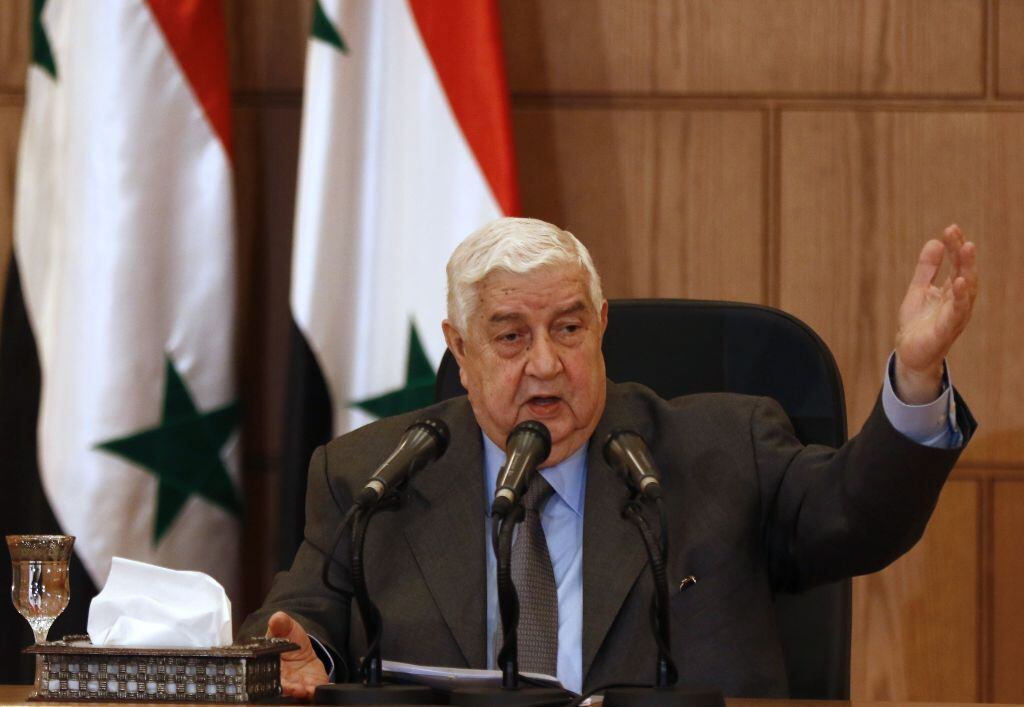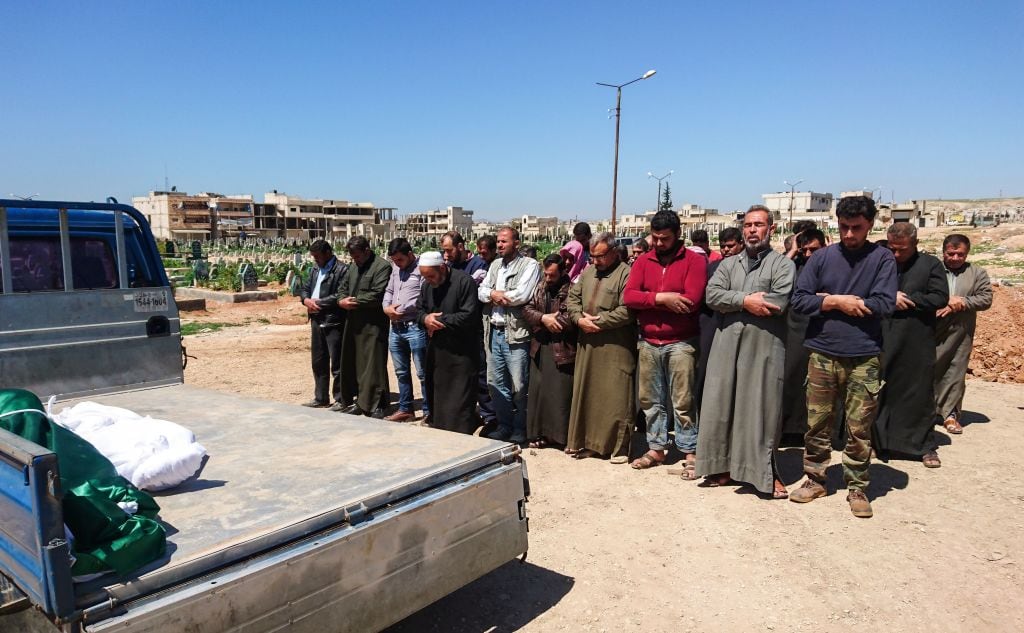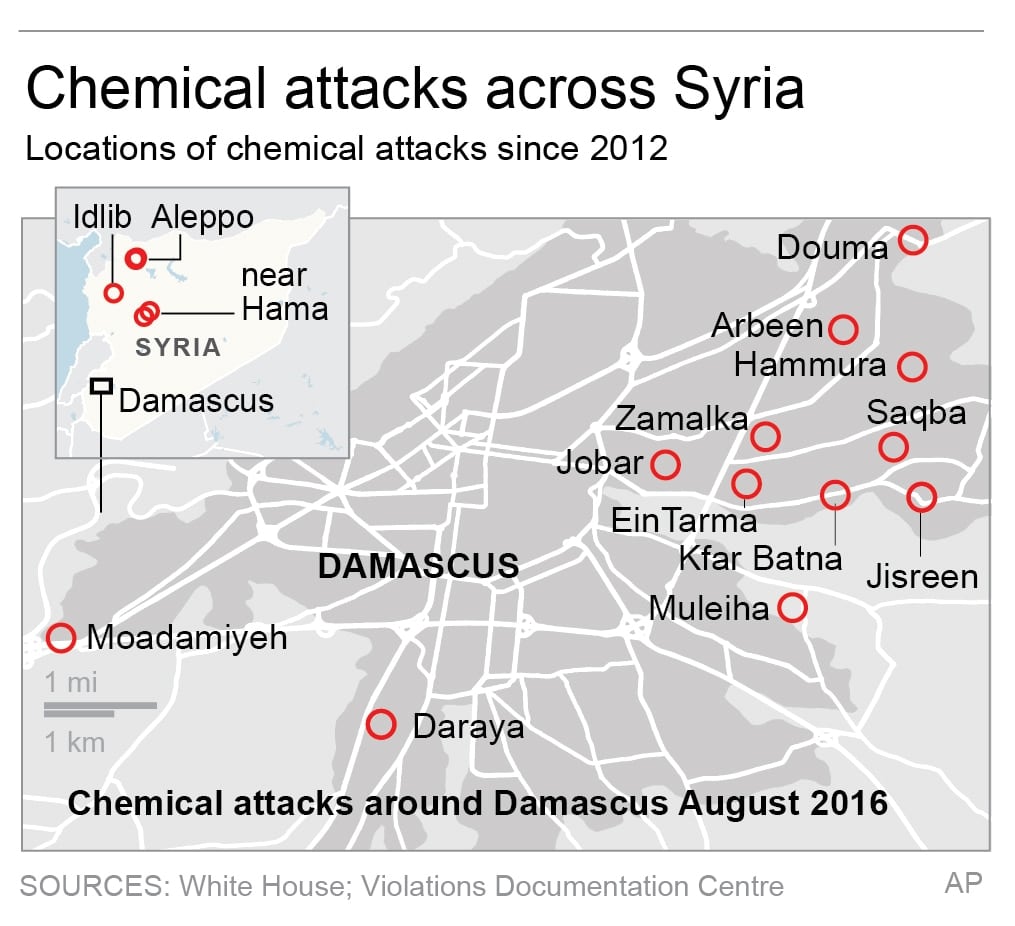BEIRUT — President Bashar Assad's government came under mounting international pressure Thursday after a chemical attack in northern Syria, with even key ally Russia saying its support is not unconditional.
Russia has provided military support for the Syrian government since September 2015, turning the balance of power in Assad's favor. Moscow has used its veto power at the Security Council on several occasions since the civil war began six years ago to prevent sanctions against Damascus.
The two countries "enjoy a relationship of cooperation, of exchange of views and full mutual support," said Peskov, a spokesman for President Vladimir Putin. Assad and his army are "the only real power in Syria that can resist terrorists on the ground," he said.
Syria maintains it didn't use chemical weapons, blaming opposition fighters for stockpiling the chemicals. Russia's Defense Ministry said the toxic agents were released when a Syrian airstrike hit a rebel chemical weapons arsenal and munitions factory on the eastern outskirts of Khan Sheikhoun.
"I stress, once again, that the Syrian Arab Army did not and will not use such weapons even against the terrorists who are targeting our people," Syria's Foreign Minister Walid Moallem told reporters in Damascus.

Syrian Foreign Minister Walid Muallem gestures as he speaks during a press conference in the capital Damascus on April 6, 2017. Syria's regime and Russia hit back at accusations that Damascus was behind a deadly chemical weapons attack, as pressure built for international action over what Washington called an "affront to humanity."
Photo Credit: Louai Beshara/AFP via Getty Images
President Donald Trump has condemned the attack, saying it had crossed "many, many lines," and put the blame squarely on Assad's forces. Speaking Thursday on Air Force One, Trump would not discuss what the U.S. might do in response. He said the attack "shouldn't have happened, and it shouldn't be allowed to happen."
On Wednesday, his U.N. envoy Nikki Haley strongly hinted some U.S. action was coming if the Security Council doesn't act.
Turkish President Recep Tayyip Erdogan hopes Trump will take military action, Turkey's state-run Anadolu Agency quoted him as saying.
Erdogan said Turkey would be prepared to do "whatever falls on us" to support possible military action, the news agency reported.
At the U.N., the United States, which currently holds the presidency of the Security Council, it drafted a resolution along with Britain and France that condemns the use of chemical weapons, particularly in the attack on Khan Sheikhoun, "in the strongest terms."
Russia objected to key provisions in the resolution and negotiations have been underway to try to bridge the differences.
Britain's deputy ambassador Peter Wilson said "what we want is a unanimous resolution ... and we want to see this done soon."
A day earlier, Russia had argued against holding Assad's government responsible.
France's U.N. Ambassador Francois Delattre indicated difficulty in reaching agreement on a resolution.
"We have engaged into negotiations in good faith to adopt a resolution - but make no mistake about it we need a robust text," he said. "We cannot be willing to have a text at any cost."
"There are fundamentals we cannot compromise with when it's about the barbaric murder of civilians, among them many children, with chemical weapons," Delattre said adding that he didn't know whether the council will be able to adopt a resolution. If Russia cast a veto, he said, "that would be a terrible responsibility in front of history."
But Delattre told the AP later he thought there was "still a chance" for an agreement with Russia.
German Chancellor Angela Merkel called the attack "barbaric" and a war crime, and she said everything must be done to investigate it urgently. She also criticized the Security Council for failing to pass a resolution condemning the attack, saying those who don't support it "should think about what responsibility they are shouldering."
French Foreign Minister Jean-Marc Ayrault urged a resumption of peace talks and said he wants Assad's government prosecuted. He told CNews television that a U.N. resolution and peace negotiations should be a top priority — not new military interventions.
"France is still seeking to talk with its partners on the Security Council ... Russia in particular," Ayrault said.
"These crimes must not remain unpunished. ... One day, international justice will rule on Assad," he added.
After the attack, hospitals around Khan Sheikhoun were overwhelmed, and paramedics sent victims to medical facilities across rebel-held areas in northern Syria, as well as to Turkey. The Britain-based Syrian Observatory for Human Rights monitoring group put the death toll at 86.
The attack happened in Syria's Idlib province about 100 kilometers (60 miles) from the Turkish border, and the Turkish government — a close ally of Syria's rebels — set up a decontamination center at a border crossing in Hatay province, where the victims were treated initially.
Turkish officials said nearly 60 victims of the attack were brought to Turkey for treatment and three of them died.

Syrians hold funeral prayers before they bury the bodies of victims of a a suspected toxic gas attack in Khan Sheikhun, a nearby rebel-held town in Syrias northwestern Idlib province, on April 5, 2017. International outrage is mounting over a suspected chemical attack that killed scores of civilians in Khan Sheikhun on April 4, 2017.
Photo Credit: Fadi al-Halabi/AFP via Getty Images
Victims showed signs of nerve gas exposure, including suffocation, foaming at the mouth, convulsions, constricted pupils and involuntary defecation, the World Health Organization and Doctors Without Borders said. Paramedics used fire hoses to wash the chemicals from the bodies of victims.
Visuals from the scene were reminiscent of a 2013 nerve gas attack on the suburbs of Damascus that left hundreds dead.
In Turkey, Anadolu and the private DHA news agencies on Thursday quoted Justice Minister Bekir Bozdag as saying "it was determined after the autopsy that a chemical weapon was used."
The Turkish Health Ministry said later that "according to the results of the first analysis, there were findings suggesting that the patients were exposed to chemical substance (sarin)."
WHO experts took part in the autopsies in the Turkish city of Adana late Wednesday, Turkish media reported.
The Organization for the Prohibition of Chemical Weapons said it has "initiated contact" with Syrian authorities and its Technical Secretariat has been collecting and analyzing information about the allegations. "This is an ongoing investigation," it said.
Russia has warned against fixing blame for the attack until an investigation is completed.

At a news conference in Damascus, Moallem echoed that statement, saying the Syrian army bombed a warehouse belonging to al-Qaida's branch in Syria that contained chemical weapons. He did not say whether the government knew in advance that the warehouse contained chemical weapons.
The minister said al-Qaida and the Islamic State group have been bringing chemical weapons from neighboring Iraq.
Asked whether Syria would give access to a fact-finding mission on the use of chemical weapons, Moallem said: "Our experiences with international investigating committees were not encouraging, because they come out of Damascus with certain indications, which then change at their headquarters."
Syria wants guarantees that any investigation would be impartial and not politicized, Moallem said.
The area of Khan Sheikhoun is difficult to access, and as more time passes since the attack, it will be increasingly difficult to determine exactly what happened.
Jan Egeland, the top humanitarian aid official with the U.N.'s Syria office, said he believes an awareness of the need to protect civilians is finally "sinking in."
He expressed hope for a "watershed moment" with "all of these world leaders saying that they have again woken up to the suffering of the civilians that we see every day."
Egeland also called for 72-hour cease-fires in key fighting zones so aid can get in and to protect hospitals and evacuees who want to leave.
Phillips reported from Moscow. Associated Press writers Albert Aji in Damascus and Edith M. Lederer at the United Nations contributed.





